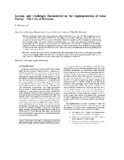Lessons and challenges encountered in the implementation of solar energy – the case of Botswana

View/
Date
2009-01-01Author
Ketlogetswe, C.
Publisher
Bentham Open http://www.bentham-open.orgRights
Article is licensed under the terms of the Creative Commons Attribution non-commercial LicenseType
Published ArticleMetadata
Show full item recordAbstract
A number of photovoltaic pilot projects have been started in Botswana since 1990. The first photovoltaic project was Manyana PV project which started in 1992. The Japanese International Cooperation Agency (JICA) PV solar pilot project is the most recent PV solar project in Botswana, which was launched in 2003 at Kudumatse, Motlhabaneng,
and Lorolwana villages. The primary objective of all these projects was to access the viability and sustainability of solar energy technology as an alternative source of energy especially for rural based communities. Depending on the findings, such projects were also intended to be replicated in other parts of the country. Despite all these efforts by the government
of Botswana and donor agencies, the level of use of PV solar systems for power generation in Botswana, particularly in
isolated communities, is very low. This paper, therefore, discusses the factors that impede the rapid development of photovoltaics power generation systems in the rural environment of Botswana. The study is focused on the photovoltaic power generation project which was carried
out in three villages in Botswana, namely Kudumatse, Lorolwana and Motlhabaneng.
